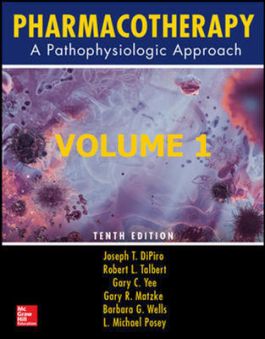EBOOK Pharmacotherapy 10e - Volume 1
- Note: the eBook does not include access to Connect
- Access the eBook anytime, anywhere: online or offline
- Create notes, flashcards and make annotations while you study
- Full searchable content: quickly find the answers you are looking for
Foundation issues
- Chapter 01: Health Literacy and Medication Use
- Chapter 02: Cultural Competency
- Chapter 03: Medication Safety Principles and Practices
- Chapter 04: Clinical Pharmacokinetics and Pharmacodynamics
- Chapter 05: Pharmacogenetics
- Chapter 06: Pediatrics
- Chapter 07: Geriatrics
- Chapter 08: Palliative Care
- Chapter 09: Clinical Toxicology
- Chapter 10: Clinical Management of Potential Bioterrorism-related Conditions
Cardiovascular Disorders
- Chapter 11: Cardiovascular Testing
- Chapter 12: Cardiac Arrest
- Chapter 13: Hypertension
- Chapter 14: Chronic Heart Failure
- Chapter 15: Acute Decompensated Heart Failure
- Chapter 16: Stable Ischemic Heart Disease
- Chapter 17: Acute Coronary Syndromes
- Chapter 18: The Arrhythmias
- Chapter 19: Venous Thromboembolism
- Chapter 20: Stroke
- Chapter 21: Dyslipidemia
- Chapter 22: Peripheral Arterial Disease
- Chapter 23: Use of Vasopressors and Inotropes in the Pharmacotherapy of Shock
- Chapter 24: Hypovolemic Shock
- Chapter 25: Introduction to Pulmonary Function Testing
Respiratory Disorders
- Chapter 26: Asthma
- Chapter 27: Chronic Obstructive Pulmonary Disease
- Chapter 28: Pulmonary Arterial Hypertension
- Chapter 29: Cystic Fibrosis
- Chapter 30: Drug-Induced Pulmonary Diseases
Gastrointestinal Disorders
- Chapter 31: Evaluation of the Gastrointestinal Tract
- Chapter 32: Gastroesophageal Reflux Disease
- Chapter 33: Peptic Ulcer Disease and Related Disorders
- Chapter 34: Inflammatory Bowel Disease
- Chapter 35: Nausea and Vomiting
- Chapter 36: Diarrhea, Constipation, and Irritable Bowel Syndrome
- Chapter 37: Portal Hypertension and Cirrhosis
- Chapter 38: Drug-Induced Liver Disease
- Chapter 39: Pancreatitis
- Chapter 40: Viral Hepatitis
- Chapter 41: Celiac Disease
Renal Disorders
- Chapter 42: Evaluation of Kidney Function
- Chapter 43: Acute Kidney Injury
- Chapter 44: Chronic Kidney Disease
- Chapter 45: Hemodialysis and Peritoneal Dialysis
- Chapter 46: Drug-Induced Kidney Disease
- Chapter 47: Glomerulonephritis
- Chapter 48: Drug Therapy Individualization for Patients with Chronic Kidney Disease
- Chapter 49: Disorders of Sodium and Water Homeostasis
- Chapter 50: Disorders of Calcium and Phosphorus Homeostasis
- Chapter 51: Disorders of Potassium and Magnesium Homeostasis
- Chapter 52: Acid–Base Disorders
Neurologic Disorders
- Chapter 53: Evaluation of Neurologic Illness
- Chapter 54: Alzheimer Disease
- Chapter 55: Multiple Sclerosis
- Chapter 56: Epilepsy
- Chapter 57: Status Epilepticus
- Chapter 58: Acute Management of the Brain Injury Patient
- Chapter 59: Parkinson Disease
- Chapter 60: Pain Management
- Chapter 61: Headache Disorders
Psychiatric Disorders
- Chapter 62: Assessment of Psychiatric Disorders
- Chapter 63: Attention Deficit/Hyperactivity Disorder
- Chapter 64: Eating Disorders
- Chapter 65: Substance-Related Disorders I: Overview and Depressants, Stimulants, and Hallucinogens
- Chapter 66: Substance-Related Disorders II: Alcohol, Nicotine, and Caffeine
- Chapter 67: Schizophrenia
- Chapter 68: Major Depressive Disorder
- Chapter 69: Bipolar Disorder
- Chapter 70: Anxiety Disorders: Generalized Anxiety, Panic, and Social Anxiety Disorders
- Chapter 71: Posttraumatic Stress Disorder and Obsessive-Compulsive Disorder
- Chapter 72: Sleep–Wake Disorders
- Chapter 73: Disorders Associated with Intellectual Disabilities
The most comprehensive text available on the use of evidence-based medication therapies for optimal patient outcomes – updated with the latest breakthroughs and guidelines.
NEW to this edition:
New focus on Personalized Medicine includes specific recommendations on the personalization of treatment and guidelines for integration of pharmacogenomic testing and implementation in practiceNew chapter on Travel HealthExtensively revised chapter on pulmonary arterial hypertension reflect the latest drugs and guidelinesMonthly updates on AccessPharmacy keeps the content fresh and currentMore than 20 online-only chapters in addition to printNew interior design keeps information flowing and makes chapters concise and to the pointCompanion Handbook is ranked #1 in Chemotherapy on Amazon and includes clearly-stated goals of therapy; the new Tenth Edition Casebook includes 150 + revised and updated cases. Pharmacotherapy: A Pathophysiologic Approach is written to help you advance the quality of patient care through evidence-based medication therapy derived from sound pharmacotherapeutic principles. The scope of this trusted classic goes beyond drug indications and dosages to include the initial selection proper administration and monitoring of drugs. You will find everything you need to provide safe effective drug therapy across the full range of therapeutic categories.
Presented in full-color the Tenth Edition is enriched by more than 300 expert contributors and every chapter has been updated to reflect the latest in evidence-based information and recommendations. This sweeping updates include tables charts algorithms and practice guidelines. This edition is also enhanced by a timely all-new chapter on Travel Health.
Here’s why this is the perfect learning tool for students, patient-focused pharmacists and other health care providers:
All chapters have been updated to provide the most current reliable and relevant information possibleKey Concepts at the beginning of each chapterClinical Presentation Tables summarize disease signs and symptomsClinical Controversies Boxes examine the complicated issues faced by students and clinicians in providing drug therapyColor coded diagnostic flow diagram treatment algorithms dosing recommendations and monitoring approaches clearly distinguish treatment pathwaysMost disease-oriented chapters include updated evidence-based treatment guidelines that often include ratings of the level of evidence to support the key therapeutic approachesEdition after trusted edition Pharmacotherapy: A Pathophysiologic Approach has been unmatched in its ability to clearly and impartially impart core pathophysiological and therapeutic elements that students and practitioners must be familiar with.

